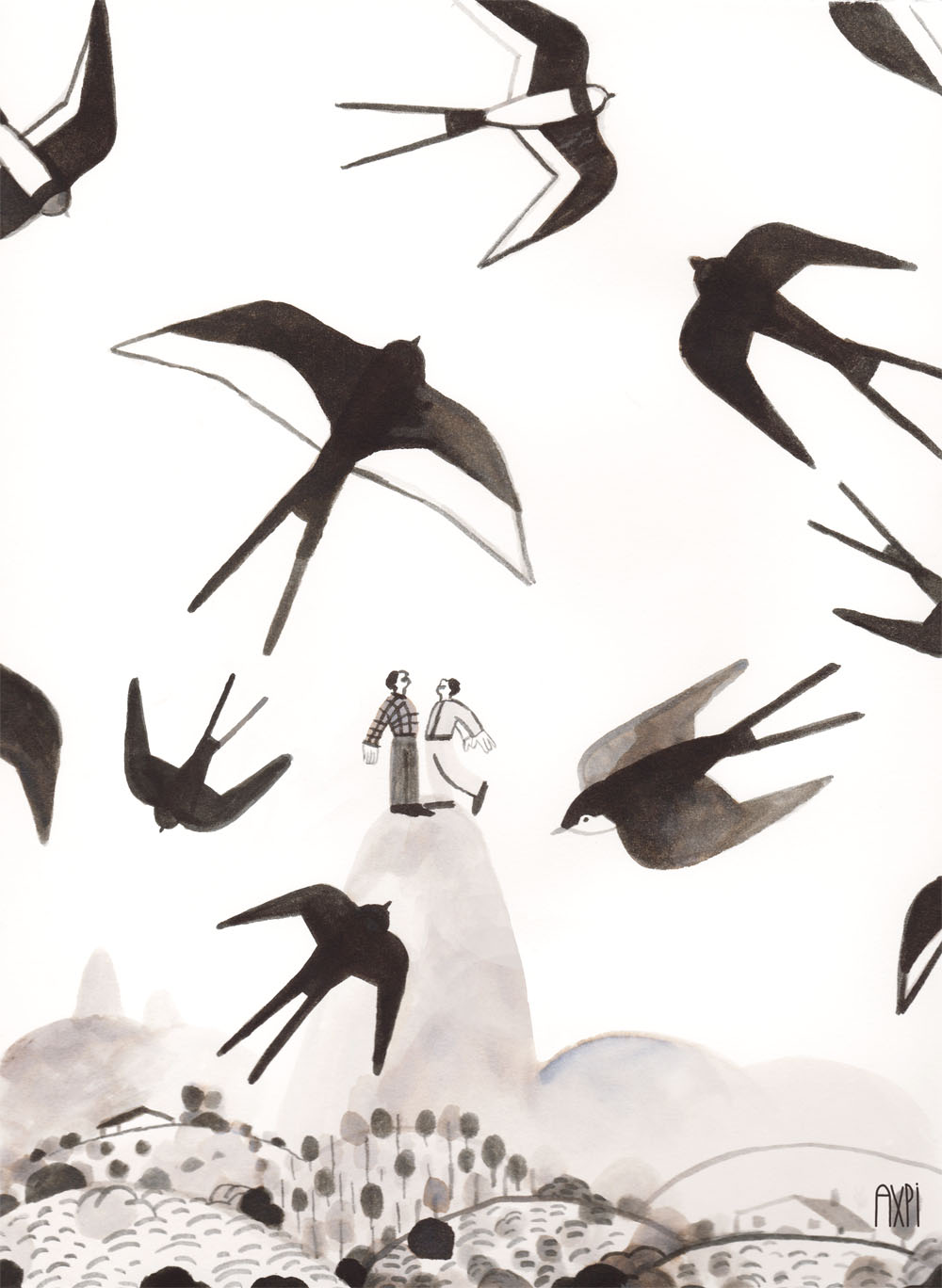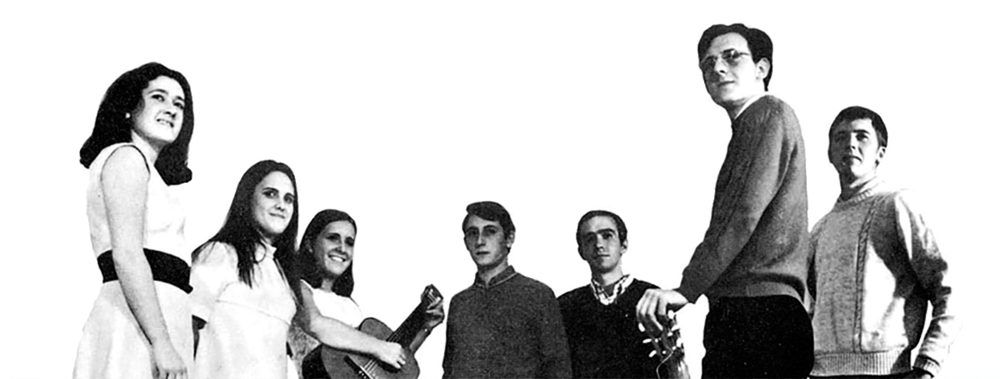Through, still
- In the twentieth century, as in previous centuries, the Basque has continued to create songs. South and North. One of the biggest inventors of the song is, without a doubt, the ezterenzubitarra Eñaut Etxamendi. I couldn't forget a hundred pieces, making lyrics and music, to offer them along with Ellande Larralde in all the squares of Euskal Herria. They've made us crazy many times to capella.

In fact, singers Etxamendi and Larralde walked along the trail, in pairs, with a simple micro, naked on the stage. Larralde gave his mouth the instrument to adapt the voices, and after a while they began to sing, in the two voices, that the audience was mute and stunned in the bass, like sorcerating the words emitted by the sound. It was surprising that at that time a communicative unity was growing as a cultural communion.
From one place to another, the couple was learning by car to think about the relatives of Etxamendi. They went from one end to the other of Euskal Herria, although initially they were aimed at the people of Baja Navarra. Being natives, while the two were absent for a while – carrying out studies and the first experiences of engineers – they returned with the intention of sharing the local situation – hard – with the ordinary people. Until recently, Jean Errekart was a lecturer in lyceum and trained the nuclei of the young generations of the Amikuze region, at least in the field of animal feed and the world economy.
Eñaut Etxamendi (1935, Ezterenzubi) worked in the field of agriculture and politics in Tolosa as a student and in the local development section of Dakar, until his return to Garazi in 1963, when he was 28 years old. At that time he composed Bidez Bide, giving a four-hour course to a group of the novice school Artesenia de Donapaleu, on a piano in a corner, he confesses, had no intention of making it public:
I
have a
song that everyone believes
me Joan arin-arin…
Eñaut Etxamendi was the youngest of the seven children in the Mendiburua village of Ezterenzubiko. In childhood he saw his mother die and, later, his six children fly to North America. As a result of the rural exodus and the industrialization movement of agriculture, he saw how the people were emptying and since 1965, with melodies full of pain, without being too painful, he recognized the collective pains as his own. And they were. He belonged to the group of intellectuals within the Enbata Union, together with Jean Louis Davant and Manex Goihenetxe. The “bourgeois” militants on the coast understood nothing of appearances. He says he started combing songs in 1963 to escape the fingers of anxiety and neurosis:
I complained of shields.
Suffering from the
heart.
I feel a pain from the shattering!
Etxamendi learned with her mother iconic songs from the Basque tradition when she was a cold child. Words, hand-copied in a notebook and wherever there were, were offered as they were given, when they were sent from time to time, from time to time, for example, to the Dartamalda, from time to time. For five years he had been drawn and modeled, and for a long time he had been sick with legs, in the kitchen, when the neighbor saw him singing.
Until he met Ellande Larralde (1939-2012), he appeared in the first sessions with Maddi Etxepare or Peio Etxegoien. Since 1967, his band companion would be the dolphin, with which he would record several albums, as well as the double work Antologia, edited by Elkar in 1998. In the version of Bidez Bide in it, Karlos Jiménez accompanies the voices to the piano. It must be said that the closeness to the Basque and to the events of the Basque militancy ignited the poetic genius and circense of Etxamendi, since in 1971 Joseba Elosegi and in 1974 Carrero Blanco distinguished with Yup the famous on both sides of the border.
Today, those who visit the interior of Ipar Euskal Herria cannot imagine that of half a century ago: the houses were dark and poor, the water was taken from the well and the light was taken from the raft and the roads were covered with grass and stone, only for the cabals and seeds! Many children, such as swallows in the pastures, left the family nests first to America, then to Paris or to Bordeaux to study and work. In the dwellings there were only those who wanted to plant themselves in the crops and those that the parents had appointed themselves to do so... Eñaut Etxamendi tells that particular environment by adapting to his Euskaldun reality of Ezterenzubi:
Let
Jender hurt
me about
it I didn't know I did...
Weak people
on
the right, silent of
good people, illuminated by Ari, like this!
The singer – and the poets! – recognises in this copla that he can only bear witness to that society that is being destroyed and revived. In the first waves the cultivation workers moved, then the descendants of the owners and finally the sons of the owners. As soon as the districts were emptied of living beings, under the direction of the politician Jean Errekart, founded in Oragar, the sad figure of 1965, at least in Amikuze, would change and Eñaut Etxamendi would participate in this development, becoming a professor of economics and building his greenhouses in Bithiriña since 1974. The “good people” spoken by the writer – the bourgeois of Donapaleu or Garazi – were not necessarily, but were managed and financed from Europe in favour of this industrial agricultural policy.
With the decline of the multitude, the Basque Country was also at risk. The elders, inevitably, and the notable aristocrats of the cities that had contact with some Basque nationalists from the beginning of the century, appreciated that ugly language on the lips of low-income beings.I
often
think of ello.En
the deep-rooted
counties In
the empty cottages I
don't have in
the observer In the alienation of birds… Here the poet brings us the proof of
a new social loneliness. Birds are just listeners and spectators. There is a huge difference, for example, between the rich morning romantic and Bidez, within just a hundred years. In the years that preceded the entry of the car into the houses, the people turned to the church, to the market, to any pretext of meeting in the villages. 28 Spring, full of experiences and dreams, when he returns from Dakar, the poet meets a human desert, and this song comes out of that gap. The conversations are exhausted, the laughter goes off and the county is getting very weird.
Etxamendi invents a mourning relative, approaching the model of the vassals of Zuberoa they like. It embellishes with a clear delicacy the tragedy that is obvious, with sweetness, but with clarity. Realizing the pain of the people, he remembers his own pain; his mother, as we said above, lost her when she was a child and gave Ttiki-Ttaka the most touching song that can be made to a mother naski.
Your mother is
about
to lock herself
in
the Nile, to lock
herself in
the Nile,
and to apologize to the Holy God at hand.
We felt the tears when we heard the last part of this song, capella and live. The two elements that justified the Basque identity were found in the creek of Paraguay, however, the house and the Basque country, undressing the people and abandoning them bones. It has to be said that for this generation, the epic recognition of this scourge constituted a kind of mythical root to guarantee the mythology of the struggle of the Abertzale left that has lasted to this day.
Eñaut Etxamendi is already known as a writer. She has written novels, stories and poetry and the editorial Maiatz has published her works in six volumes. It also appeared in the field of politics and research of the time.
We continue with the song of the roads at the head, after the wave of industrialization of the crops that we opened 40 years ago, when we travel through the rural areas of our counties, which has become even more empty of life.
Last year, I met a Braham in Delhi. I was surprised that I loved beer and knew it in Spanish. I would say it would be my oldest, but I was walking with the help of a stick, slowly. To see why he knew Spanish, I asked him and he told me that he learned as a child because he heard... [+]
You know how it goes, right? "Dream txuntxurrun green, dream bite...". It is undoubtedly the most famous crib song in Euskera, and also has Vitoria as its protagonist. After a brief study, I learned that Resurrection Mª de Azkue collected in 1922 three versions of the song in his... [+]
Abenduaren 6an agurtu du pilotaren munduak azaroaren 30ean zendutako azkaindarra. Profesional mailan ezker paretan txapela jantzi zuen Ipar Euskal Herriko lehen pilotaria da: bi txapel jantzi zituen binakako txapelketan, Joxan Tolosarekin.
Gasteizko Oihaneder Euskararen Etxearen Batera proiektuen emaitzetarik bat gauzatu du berrikitan Maider Lasak, Malen Iturrirekin elkarlanean. Ekainean aurkeztu zuten Loa, loa, laguna izeneko ikusgarri performatiboa, ahotsez, gorputzez eta irudiz. Tradiziozko lo-kantak oinarri,... [+]
Bost hamarkada baina gehiagoko ibilbidearekin, Oskarbi taldeak badaki zer den egoera zailetan musikaren eta kulturgintzaren haria elikatzea. Ez Dok Amairuren garaietatik gaurdaino, herri kantak eta sormen propioa izan ditu iturri. Hamabigarren diskoa grabatzen ari dira, dozena... [+]
Artzain izan nahi zuen txikitatik, eta artzantzaz bizi da duela hogei urtetik hona. Kantuan aritzea gustuko du eta kantuan ari da etxean bezala plazaz plaza. Ez omen da bizitza idilikoa berea, baina ez omen litzateke beste inon eta beste ezertan zoriontsuago izanen. Urepeleko... [+]
























